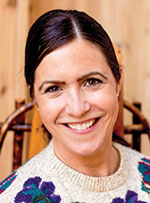Twenty Something / Christina Capecchi
Grandma’s memories of music, like mercy, streaming down the river
 It began as a low hum on the horizon, barely perceptible. Then a pulsing rhythm rose from the river—the brass and beat of a live band drifting through the humid summer air. The Capitol was coming.
It began as a low hum on the horizon, barely perceptible. Then a pulsing rhythm rose from the river—the brass and beat of a live band drifting through the humid summer air. The Capitol was coming.
The steamboat curved along the Mississippi like a grand dame entering a ballroom—confident, luminous, utterly composed. Lights blinked along her decks. A calliope sang out, bold and cheerful, steam puffing into twilight. She rounded the bend at Pickerel Lake and made her way to downtown St. Paul, Minn., her paddle wheel churning a white froth behind her.
She was a showpiece of her time—multi-tiered, whitewashed, trimmed with gingerbread woodwork and glowing lanterns. At 280 feet long, she was the largest sternwheel passenger steamer on the mighty Mississippi—a floating ballroom where couples danced and romanced.
Fate Marable led his band through lively two-steps and bluesy waltzes. Songs like “Frankie and Johnny” and “When the Saints Go Marching In” filled the air. A young trumpeter named Louis Armstrong blasted his horn toward the river.
Up on the bluffs, porches stirred to life. Screen doors creaked open. Neighbors leaned against railings, drawn to the music that swelled and swung—jazzy, syncopated, alive. Trombone. Saxophone. Clarinet. The sound carried, echoing off the limestone and lilacs. It wasn’t just background. It was invitation.
You could feel the music in your chest. It stirred the river. It stirred something else, too.
Those who heard it from above would never forget it—the surprise of music rising from the water, unexpected and unearned. The Capitol began its circuit in the 1920s and continued into the 1930s, the height of the Great Depression, reminding riverside residents that some gifts are free, how the simplest pleasures are often the sweetest.
One of those residents was Mary Ellen Flynn, a redheaded girl in St. Paul—my grandma. The Great Depression had forced her family to relocate, shuttering their general store and leaving behind their beloved small-town community in Beardsley, Minn., to move into her grandparents’ house in St. Paul. It was a time of loss, uncertainty and role reversals. Mary Ellen’s mom found a job before her dad did. Grandma remembers being home with him, doing the dishes side by side before their evening rosary.
There, on the bluffs of the Mississippi, Mary Ellen heard The Capitol and felt God’s nearness—music, like mercy, streaming down the river. She didn’t know then that music would soothe and sustain her for many decades to come.
Soon she would land on a piano and discover an ability to play songs by ear. The skill would serve her the rest of her life—as a kindergarten teacher, as a mother of six, as a Girl Scout troop leader, as a widow fending off loneliness, as a volunteer, as a neighbor, as a 95-year-old great-grandmother today.
Her upright Kohler & Campbell piano anchors our extended family, one point in the living-room triangle it forms with the fireplace and picture window. We gather around it for holidays and birthdays, Grandma perched on the piano bench, plucking out spirited marches and patriotic hymns, Christmas carols and “Peter Cottontail.”
Like her Catholic faith, music has always been a balm. “Throughout my long life,” Grandma said, “I have been guided and protected by an amazing God, who has loved and understood and forgiven me every step of my journey.”
God reached her wherever she was, however he could—in the classroom, in the kitchen, even on the river, curving around the bend and pulsing in her heart.
(Christina Capecchi is a freelance writer from Grey Cloud Island, Minn.) †
 It began as a low hum on the horizon, barely perceptible. Then a pulsing rhythm rose from the river—the brass and beat of a live band drifting through the humid summer air. The Capitol was coming.
It began as a low hum on the horizon, barely perceptible. Then a pulsing rhythm rose from the river—the brass and beat of a live band drifting through the humid summer air. The Capitol was coming.